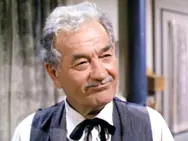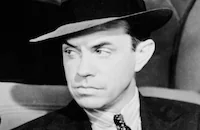The Judge
Cast & Crew
Elmer Clifton
Milburn Stone
Katherine Demille
Paul Guilfoyle
Stanley Waxman
Norman Budd
Film Details
Technical Specs

Synopsis
Judge Allan J. Brooks relates a case history from his files about a noted criminal lawyer, Martin Strang, who cheated the forces of law and order: James Tilton, a murderer for whom Strang had won an acquittal, is driven berserk by the violin playing of an eleven-year-old, disabled boy and shoots the boy and his dog, killing them. Meanwhile, Martin who has been investigating his wife Lucille's affair with police psychiatrist Dr. James Anderson, finds a key in her purse and makes an impression of it. Later, after Lt. Edwards of the Homicide Bureau informs Martin that Tilton has requested his services again and adds that Anderson has already scheduled a private evaluation of the killer, Lucille criticizes Martin for freeing a murderer who has now killed an innocent child. Although Martin states that his conscience is clear as he has always stayed within the bounds of legal ethics, Lucille accuses him of killing his own brother as Martin, who had supported his brother through law school, had him disbarred, which then led to his suicide. Martin discovers that a miniature manuscript of a violin concerto has been found in Tilton's possession and that Edwards has made a recording of the passage the boy was practicing. During the examination in Anderson's office, the doctor injects Tilton with sodium pentathol, the truth serum, and establishes that he has a trauma related to violins. Tilton, who has a deformed hand, states that he hated his brother who was a violin prodigy, but was unable to "feel" the music, an although Tilton wanted to play the instrument, he could not due to his hand. When presented with an unloaded gun, Tilton attempts to shoot the machine reproducing the violin solo. Anderson declares that Tilton is completely sane and has only a neurosis, while Martin insists that Tilton is obviously insane. While Anderson is otherwise occupied, Martin takes his gun and bullets. Later, in a park, Martin witnesses pickpocket William Jackson shoot and kill a police patrolman who had earlier told him that his bond had expired. Martin arranges to defend Jackson and, in private, tells tells him that he expects him to do something for him in return for an acquittal. In court, Martin moves that the case be dismissed as the patrolman's bond had expired four days before his death and thus he was not a lawfully constituted officer and therefore the section of the criminal code under which Jackson was indicted does not apply. The judge, realizing that Martin has found a legal loophole and that he is going to have to free a murderer on a technicality, tells the court that it is a grave miscarriage of justice and a violation of moral rights. Later, using his forged key, Martin arranges to meet Jackson in Anderson's apartment while Anderson is absent, and convinces him to put on a straitjacket, then advises him that the district attorney will doubtlessly re-indict him for killing a civilian. Martin then pulls out Anderson's gun and informs Jackson that they are going to play Russian roulette. Jackson soon passes out but when Martin removes the jacket, Jackson slugs him, knocking him out. In a dream, Martin tells Lucille about a case involving a trap for Anderson. Lucille admits she sought companionship, and nothing more, with Anderson as she was unable to communicate with Martin. However, Martin is not convinced and recounts details of their loveless life together until Lucille admits that she loves Anderson. Martin then tells her that he has made a will leaving everything to the families of those who have suffered at the hands of the many murderers he has set free. Emerging from his dream, Martin invites Jackson to shoot him, which he does, killing him. Later, at Anderson's office, Edwards informs both Anderson and Lucille that Martin has been found dead in Anderson's apartment. Edwards adds that his death was supposed to look like suicide but was really a murder. Lucille has an alibi, but Anderson has none and, as it was his gun that killed Martin, Edwards books him on suspicion of murder. In the present, the judge explains that Jackson was arrested weeks later attempting to leave town and pled guilty to killing the patrolman. While on death row, he also confessed to killing Martin, but his admission came too late for Anderson, who took his own life a few days earlier.

Director
Elmer Clifton
Cast

Milburn Stone

Katherine Demille

Paul Guilfoyle
Stanley Waxman
Norman Budd

Jonathan Hale

John Hamilton
Joe Forte
Jesse Kirkpatrick
Herb Vigran
Barney Phillips
Charles Williams
Tom Holland
Bob Jellison
Crew
Anson Bond
Anson Bond
Anson Bond
Elmer Clifton
Perry Finnerman
Ray Foster
Ben Kline
Gene Lanham
Sascha Laurence
Julius Long
Buddy Longworth
Fred Maguire
C. O. Morris
Samuel Newman
James Punter
Al Spencer
Maurice Vaccarino

Film Details
Technical Specs

Quotes
Trivia
Notes
The "music" in this film was provided by an a cappella choral group. The Judge was the inaugural picture of Emerald Productions, Inc., which was owned by Ida Lupino, her then husband, Collier Young, and Anson Bond.












